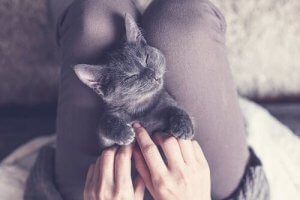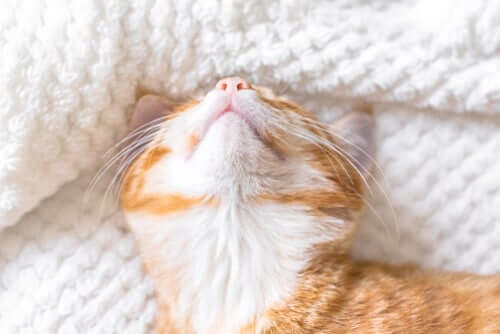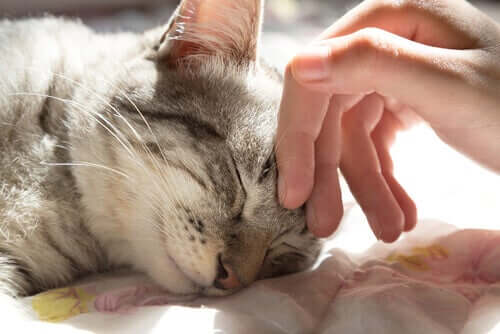How Many Hours Sleep Do Cats Need?

Like any other animal, cats need their daily hours of sleep. A good night’s sleep is essential for their well-being, just like us!
So, how many hours sleep is best?
A domestic cat sleeps an average of 15 or 16 hours a day. These hours can be over a long continuous period of time or spread over several naps. As you can see, this is a large part of their day. Resting is an important part of a cat’s life!
In addition, the hours of sleep will depend on the cat’s age. For instance, a kitten will sleep longer than an adult cat, and the same is true for older cats.
It’s also relevant to mention that cats are nocturnal animals, so much of their sleep occurs during the day. This is especially true if they’re often alone in the morning. The times when cats are most active coincide with sunrise and sunset.
The time we get home is usually the time when they play or eat. This means that the time of the day when they’re awake probably coincides with our arrival. This fact, along with their cat-like nature, explains why your cat bothers you just as you go to bed or when you’re already there.

A cat’s environment
One element that influences how much sleep cats need is their activity at home. A cat that goes out into the street or has access to a garden has more stimulation than a house cat. Similarly, a cat that lives with another cat always has a playmate, as well as if a cat is always around its owner.
Having company all day, a place to walk or hunt, a window to look out of, scratchers to climb or toys provides the animal with enough activity to spread out its sleeping hours and get some rest at night as well.
Where do cats prefer to sleep?
Cats can sleep in very strange positions, worthy of a contortionist. We’re usually able to notice at first sight when a cat is comfortable enough.
They’re always looking for a warm place, especially if it’s autumn or winter and it’s cold outside. Hiding places and scratching beds are always a good option. In summer, they’ll probably look for a cool place and usually be less active during the day.
They tend to prefer sheltered places, although they’ll never refuse the comfort of a sofa unless a cardboard box is involved!

Why is sleep important?
Sleep is every animal’s basic need, and it’s by sleeping that they replenish the energy they spent during the day. This process is quite essential for proper physical and mental functions and conditions.
It also affects the development of the brain: sleep is essential for memory and learning reinforcement.
Sleep is divided into several phases that occur continuously and alternately. In other words, during all their stages of sleep an animal can dream and even have nightmares.
- Non-REM phase or deep sleep. Deep sleep is when most dreams occur, and it’s very common to watch a cat trying to catch something imaginary while they’re sleeping. During this phase, there’s a high peak of growth hormone secretion, so it’s very important for newborns to get enough sleep in their early stages in order to grow.
- REM (rapid eye moment) phase. This phase is known by its acronym in English and it’s basically when the eyes move quickly during sleep. It’s in the REM sleep phase that everything learned so far is ‘stored’ in memory.
Now that you know the importance of sleep for your cat, if you see any weird changes in your cat’s sleep patterns, take note and go to see your vet if you have any concerns.
Like any other animal, cats need their daily hours of sleep. A good night’s sleep is essential for their well-being, just like us!
So, how many hours sleep is best?
A domestic cat sleeps an average of 15 or 16 hours a day. These hours can be over a long continuous period of time or spread over several naps. As you can see, this is a large part of their day. Resting is an important part of a cat’s life!
In addition, the hours of sleep will depend on the cat’s age. For instance, a kitten will sleep longer than an adult cat, and the same is true for older cats.
It’s also relevant to mention that cats are nocturnal animals, so much of their sleep occurs during the day. This is especially true if they’re often alone in the morning. The times when cats are most active coincide with sunrise and sunset.
The time we get home is usually the time when they play or eat. This means that the time of the day when they’re awake probably coincides with our arrival. This fact, along with their cat-like nature, explains why your cat bothers you just as you go to bed or when you’re already there.

A cat’s environment
One element that influences how much sleep cats need is their activity at home. A cat that goes out into the street or has access to a garden has more stimulation than a house cat. Similarly, a cat that lives with another cat always has a playmate, as well as if a cat is always around its owner.
Having company all day, a place to walk or hunt, a window to look out of, scratchers to climb or toys provides the animal with enough activity to spread out its sleeping hours and get some rest at night as well.
Where do cats prefer to sleep?
Cats can sleep in very strange positions, worthy of a contortionist. We’re usually able to notice at first sight when a cat is comfortable enough.
They’re always looking for a warm place, especially if it’s autumn or winter and it’s cold outside. Hiding places and scratching beds are always a good option. In summer, they’ll probably look for a cool place and usually be less active during the day.
They tend to prefer sheltered places, although they’ll never refuse the comfort of a sofa unless a cardboard box is involved!

Why is sleep important?
Sleep is every animal’s basic need, and it’s by sleeping that they replenish the energy they spent during the day. This process is quite essential for proper physical and mental functions and conditions.
It also affects the development of the brain: sleep is essential for memory and learning reinforcement.
Sleep is divided into several phases that occur continuously and alternately. In other words, during all their stages of sleep an animal can dream and even have nightmares.
- Non-REM phase or deep sleep. Deep sleep is when most dreams occur, and it’s very common to watch a cat trying to catch something imaginary while they’re sleeping. During this phase, there’s a high peak of growth hormone secretion, so it’s very important for newborns to get enough sleep in their early stages in order to grow.
- REM (rapid eye moment) phase. This phase is known by its acronym in English and it’s basically when the eyes move quickly during sleep. It’s in the REM sleep phase that everything learned so far is ‘stored’ in memory.
Now that you know the importance of sleep for your cat, if you see any weird changes in your cat’s sleep patterns, take note and go to see your vet if you have any concerns.
All cited sources were thoroughly reviewed by our team to ensure their quality, reliability, currency, and validity. The bibliography of this article was considered reliable and of academic or scientific accuracy.
- Debru, C. (2009). Neurofilosofía del sueño (Vol. 51). Editorial CSIC-CSIC Press.
- Yoo, S., Hu, P., Gujar, N. et al. A deficit in the ability to form new human memories without sleep. Nat Neurosci 10, 385–392 (2007).
This text is provided for informational purposes only and does not replace consultation with a professional. If in doubt, consult your specialist.








